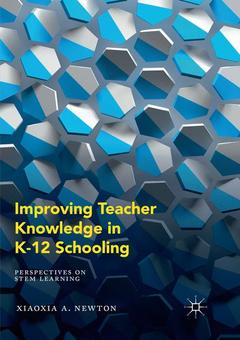Description
Improving Teacher Knowledge in K-12 Schooling, 1st ed. 2018
Perspectives on STEM Learning
Author: Newton Xiaoxia A.
Language: English
Subjects for Improving Teacher Knowledge in K-12 Schooling:
Approximative price 26.36 €
In Print (Delivery period: 15 days).
Add to cart
Improving Teacher Knowledge in K-12 Schooling
Publication date: 12-2018
Support: Print on demand
Publication date: 12-2018
Support: Print on demand
Improving Teacher Knowledge in K-12 Schooling
Publication date: 03-2018
Support: Print on demand
Publication date: 03-2018
Support: Print on demand
Description
/li>Contents
/li>Biography
/li>Comment
/li>
This volume examines how several key components of the mathematics education system in the United States fail to provide teachers with adequate and effective tools to teach mathematics in K-12 classrooms. These components consist of teachers? own learning experiences as students in K-12 classrooms, their undergraduate or graduate trainings in mathematics, and their in-service professional development trainings. Newton argues that unless we improve these system components as a whole and recognize the importance of teaching future mathematics teachers explicitly and rigorously the topics they are expected to teach, teachers will continue to recycle a body of incoherent and incomprehensible mathematical knowledge to their students, because these are the only types of mathematical knowledge they have at their disposal, both in terms of what they themselves have learned as K-12 students and in terms of the mathematical resources available to them, including the textbooks they rely on to teach as mathematics teachers.
1. K-12 Mathematical Learning Experiences
2. Teachers’ and Math Coaches’ Understanding of Basic Mathematical Ideas
3. Undergraduate STEM Majors’ Understanding of Slope
4. Opportunities to Learn Mathematics through Professional Development and Instructional Tools
5. Conceptual Understanding of Foundational Mathematical Topics: What Might They Look Like?
6. Placing Mathematics Teachers’ Content Training in the Broader Context in the US
Xiaoxia A. Newton is Associate Professor in the Graduate School of Education, University of Massachusetts Lowell, USA.
Includes extensive qualitative analyses of classroom mathematics teaching and learning
Illustrates the impact of the No Child Left Behind (NCLB) Act on the accountability system
Proposes a set of solutions for improving mathematical understanding among teachers across the country
© 2024 LAVOISIER S.A.S.




